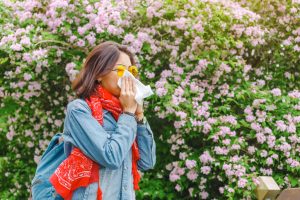Spring is a beautiful time of year. The weather starts to improve, there are more hours of daylight, and people spend more time outdoors. It is also the time of year when flowers, grasses, weeds, and trees start to bloom and release pollen into the air.
Pollen triggers an immune reaction by releasing histamine into the blood. The immunologic or allergic reaction can manifest as sneezing, a runny nose, coughing, itchy skin, wheezing, head congestion, and watery eyes.
Diagnosing allergies can be done by either a blood test or by a skin test. The skin test involves pricking the skin with different allergens and seeing which ones cause a reaction.
Once an allergy is identified it can be treated with:
- Oral antihistamines
- Oral decongestants
- Nasal sprays
- Eye drops
- Allergy shots
- Nasal saline irrigation
Some suggestions for minimizing the effects of springtime allergies include:
- Avoiding freshly cut grasses
- Staying indoors on windy days
- Keeping windows closed
- Wearing a face mask outdoors
- Washing your hands, hair, and clothing frequently after being outdoors
- Using an air conditioner and changing the filters frequently
- Using an air purifier with a HEPA filter
- Keeping pets clean
If you suffer from springtime allergies, speak to your physician about getting tested and ways to treat them. To schedule an appointment with a physician at Flushing Hospital Medical Center, please call 718-670-5486.
All content of this newsletter is intended for general information purposes only and is not intended or implied to be a substitute for professional medical advice, diagnosis or treatment. Please consult a medical professional before adopting any of the suggestions on this page. You must never disregard professional medical advice or delay seeking medical treatment based upon any content of this newsletter. PROMPTLY CONSULT YOUR PHYSICIAN OR CALL 911 IF YOU BELIEVE YOU HAVE A MEDICAL EMERGENCY.

